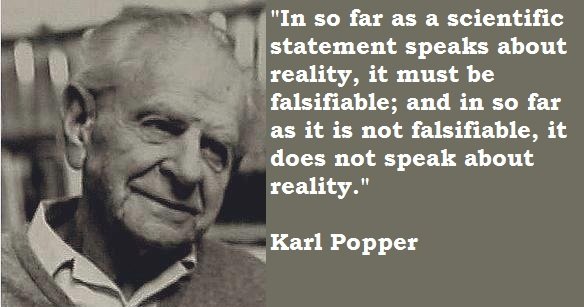Karl Popper is a philosopher most famous for his works on the philosophy of science and political philosophy. He believed that good science should be falsifiable, meaning that its theoretical and hypothetical statements should be subject to testability.

He saw that life continually presents us with new problems. The best way to deal with problems is to propose new scientific theories, but that these theories should be continually tested, and criticized in an effort to improve them. We try, in this way, to kill our false theories and our ineffective institutions before they kill us.
Popper's critique of Marxism
Popper also interestingly extended this theory of falsification to scrutinize the scientific basis of modern Marxism, Freud's psycho-analysis and Adler's individual psychology. The following BBC video wonderfully describes his critique of modern Marxism from a scientific point of view:
Marx had predicted from his theory of history that a natural and spontaneous revolution from the working class against the proletariat would erupt. History, however, has shown that this has not happened. Hence, we should conclude that Marx's theory of history was wrong. Nonetheless, modern Marxists have reformulated this narrative, and have since argued that revolutions did not happen due to people's 'false consciousness'. According to them, the working class are oppressed by capitalism, but their false consciousness prevents them from realizing.
Formulating the theory of history in such a way, Marxists' theories could never have been falsified anymore. If the working class were revolting, Marx was right. If the working class were not revolting, the Marxists were still right because it was all due to people's false consciousness.
What is good science according to Popper?
In Conjectures and Refutation (1963), Popper clearly lists up the attributes of a good scientific theory. He writes that:
- It is easy to obtain confirmations, or verifications, for nearly every theory — if we look for confirmations.
- Confirmations should count only if they are the result of risky predictions; that is to say, if, unenlightened by the theory in question, we should have expected an event which was incompatible with the theory — an event which would have refuted the theory.
- Every “good” scientific theory is a prohibition: it forbids certain things to happen. The more a theory forbids, the better it is.
- A theory which is not refutable by any conceivable event is non-scientific. Irrefutability is not a virtue of a theory (as people often think) but a vice.
- Every genuine test of a theory is an attempt to falsify it, or to refute it. Testability is falsifiability; but there are degrees of testability: some theories are more testable, more exposed to refutation, than others; they take, as it were, greater risks.
- Confirming evidence should not count except when it is the result of a genuine test of the theory; and this means that it can be presented as a serious but unsuccessful attempt to falsify the theory. (I now speak in such cases of “corroborating evidence.”)
- Some genuinely testable theories, when found to be false, are still upheld by their admirers — for example by introducing ad hoc some auxiliary assumption, or by reinterpreting the theory ad hoc in such a way that it escapes refutation. Such a procedure is always possible, but it rescues the theory from refutation only at the price of destroying, or at least lowering, its scientific status. (I later described such a rescuing operation as a “conventionalist twist” or a “conventionalist stratagem.”)
One can sum up all this by saying that the criterion of the scientific status of a theory is its falsifiability, or refutability, or testability.
Reference
Karl Popper - Conjectures and Refutations (1963)
Nice post Lin.. :)
Thanks, Lem!
Fantastic article. Much of what I already believed, yet described in fantastic detail. I'll need to look into Popper a bit more. For now, you've got my follow.
Thank you! :) I'm happy to know that you have enjoyed the writing.
I already feel smarter, your posts are amazing man!
Thanks, man! Let's get smarter together...
yhx ! nice post :)
nice post, do you have any links to the changes wrought by modern marxists?
I believe there is still time for the revolution Marx was talking about. Nonetheless great post I was not aware of the list of science's attributes.
Great work man
Exciting to see some Popper on here. I'm looking to write some posts in the future on philosophy of science. Very glad to see a philosophy steemit community forming.
Yeah, I have followed you. Am looking forward to see your philosophical posts :)
Congratulations @chhaylin! You have completed some achievement on Steemit and have been rewarded with new badge(s) :
Click on any badge to view your own Board of Honor on SteemitBoard.
For more information about SteemitBoard, click here
If you no longer want to receive notifications, reply to this comment with the word
STOPSounds like Milton Friedman's idea that the more preposterous a theory is, the more accurate and better it is. Even if it flies in the face of the evidence. Never been much of a fan of philosophy, and although some of the above is perfectly acceptable logic, if banal, some merely demonstrates a massive misunderstanding of what real science sets out to achieve. If a theory is refutable with facts, then the theory is merely a stepping stone to the truth. If the theory is irrefutable, then it is the truth.
Awesome! Nassim Taleb turned me on to Karl Popper and I'm amazed by the man!
It's strange to think that the psychopath George Soros and I share such intellectual influences.
Congratulations @chhaylin! You have received a personal award!
Click on the badge to view your own Board of Honor on SteemitBoard.
For more information about this award, click here